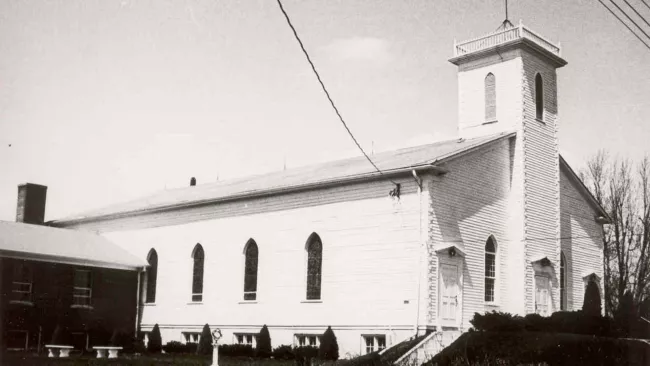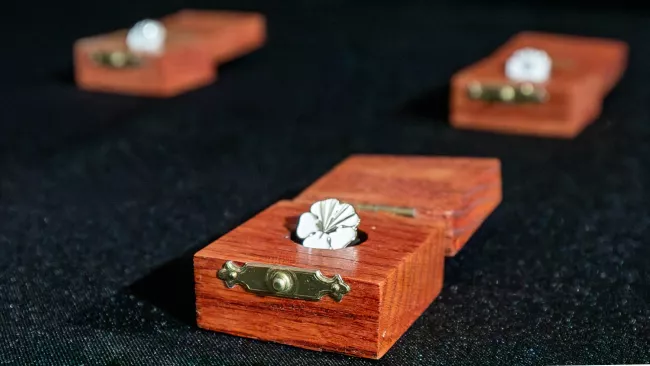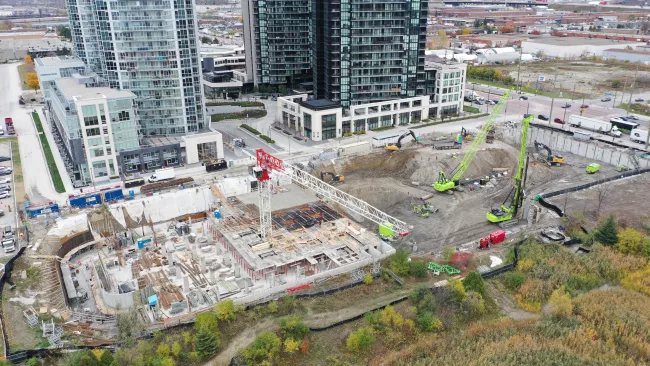From the archives: Holy Trinity Anglican Church
From the traditional territories of the First Peoples of Turtle Island, to a farmland community, to a bustling city centre and everything in between – Vaughan's transformation is a story worth telling. The City of Vaughan’s popular monthly series continues, with historical content from the Vaughan Archives.
Scroll through memory lane, learn about the city's past and explore the places, people and events that were pivotal to the development of the Vaughan we know today. This month’s feature is on the Holy Trinity Anglican Church.
The Holy Trinity Anglican Church, located in Thornhill, is one of the oldest churches in Vaughan. John Strachan, who later became the first bishop of Toronto, officially opened the church in 1829 and held the first service on Feb. 29, 1830. According to City records, it is believed the first wedding at the church took place in May 1830, between Mary Sophia Gapper and Captain Edmund O’Brien.
The church’s first rector was Reverend George Mortimer, and the first warden was William Parsons. William’s brother, who lived in England, contributed to the funding of the church. This helped to expand the church in 1840 by building a rectory for them to live in.
Originally, there was no space in the church to hold Sunday school or other meetings. This led to the creation of a parish hall in 1928 on the same land.
Then, in 1950, the church was remodelled and built on a new site, approximately one kilometre south of the original location, on the corner of present-day Old Jane Street and Brooke Street.
In 1960, a large red brick hall was erected beside the church. Since then, the high pulpit and pews have been replaced, and the heating and lighting have been upgraded. Holy Trinity Anglican Church continues to serve its community to this day with weekly services.
ABOUT VAUGHAN ARCHIVES
Established in 1988, the City’s Archives is home to more than 600 collections, consisting of both City records and cultural records about Vaughan from 1860 to the present day. Records include, but are not limited to:
- City business records with long-term legal and administrative value, such as Council meeting minutes, by-laws, assessment rolls, financial records, reports and official correspondence
- church, community and school records
- census records
- historical photographs
- land records
- historical maps, plans and aerial photographs
- newspapers
- personal papers of past residents and founding families, such as diaries, family histories, journals and letters
- records of local organizations, both past and present
VIEW VAUGHAN'S ARCHIVES ONLINE!
The City's Archival Collection is on digital display for all to explore! The below galleries are available in the City's online gallery on Flickr:
- Families in Arms
- Archival Awareness
- Early Churches of Vaughan
- Early Communities of Vaughan
- Early Pioneers of Vaughan
- From Township to City: The Evolution of Vaughan
- Historical Families of Vaughan
- Historical Photography
- Recollections of Rural Vaughan
- The Mary Wood Collection
- The Way We Were: Representations of Vaughan's Past
- Vaughan Working Environments
- Vaughan Through the Ages: Medicine, Music and Sports and Recreation
- And more!
A personal Flickr account is not required to access the City's online gallery, which contains only a small selection of the full archives collection. If you are looking for a particular image, original file, primary source record or more, please visit the Archival Database, or contact the Vaughan Archives by calling 905-832-2281 or emailing archives@vaughan.ca.
By managing and preserving both City and community records, the Enterprise Information Management Services team ensures that Vaughan's rich and varied history will continue to be available for future generations. Learn more at vaughan.ca/archives.
For the latest updates, subscribe to Vaughan News and follow the official corporate channel on X (formerly known as Twitter), Facebook, Instagram and LinkedIn.





